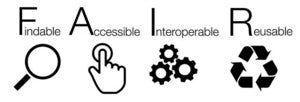International Open Access week puts the A in FAIR. The foundation of Open Access is the ethical tenet that information is an inalienable human right guaranteed to every person. Utilizing FAIR principles for data is one step in supporting and promoting this tenet.

No matter where you are in your research journey, the FAIR principles will be integral to managing and sharing your research data. You may already know what the FAIR acronym stands for. Perhaps you are already incorporating the principles into your research life. It comes as naturally as adding a little cream to your morning coffee. And of course, just like you can't help but check the cream's expiration date before that splash into your coffee, let's ensure your understanding of FAIR is accurate and applied appropriately and where you can get support if needed.
Here is some research data trivia for you. The FAIR Guiding Principles for scientific data management and stewardship were first published in Scientific Data in 2016 in answer to the increase in volume and complexity of data creation. Following these guidelines will help people and machines access and use your data:
- Findability- data and metadata are indexed as a searchable resource so others can find them
- Accessibility- data can be retrieved via a free, open, and standardized protocol that is universally implementable
- Interoperability- data can be integrated with other data and systems
- Reusability- data is appropriately licensed for release, usability, and repurposed
What does that all mean? In simple terms, humans make data understandable to machines, and by doing so, they will support data management and facilitate data sharing and reuse by third parties. Moreover, FAIR is an excellent way to advance your research and science.
What is not trivial about the FAIR principles is that they are an integral part of the 2023 NIH Data Management and Sharing (DMS) Policy. So if you are receiving or hope to receive NIH funding, you must follow these principles. If you are thinking, 'nope, not doing NIH funding — this doesn't pertain to me,' think again. The FAIR Data Principles apply to all research data. The NIH holds researchers accountable, hoping that data creation and sharing becomes intrinsically habitual and responsible. You can check your funding source to see if they are following in the footsteps of the NIH.

The great news is ASU has your back on this — start to finish. ASU offers numerous resources to not only understand the guidelines but also to meet them efficiently. We encourage you to contact the Research Data Management Office as your first step in your research project.
The ASU Library Researcher Support team can also help connect you with experts and resources to assist you with your research and publishing needs. We have tutorials to help you get the necessary skills and provide a research data repository to publish ASU-affiliated research data. And if you are still trying to figure out where to start or need to ask questions, reach out to us, and we'll get you on the path to FAIR sharing.